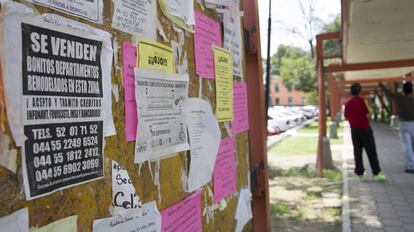How Mexico City is being taken over by ‘roomies’
Changing habits and high rents are persuading a new generation in the capital to share apartments

Driven mainly by financial necessity, a new generation of Mexicans living in the country’s capital is finding that the only way they can afford to leave home is by embracing the sharing economy, a new survey reveals.

Data from consultancy company Atlantia Search shows that 65.7% of people sharing apartments in Mexico City said they were doing so primarily to reduce living costs and enjoy a better standard of living at more affordable prices, although meeting new people was also a factor.
Average earnings in the capital have grown by 1.4% annually over the last five years, while rents have risen by 3.3% during the same period, according to official figures.
To put those numbers into perspective, in October 2013, the rent on a typical apartment in the center of the capital cost around $580 a month, a figure that has since risen to $950, according to property site Propiedades.com, a 63% increase in just over four years. Average wages in Mexico City vary between $350 and $450.
The last time I was looking for a roomie, I was inundated with offers Iván Romero, Mexico City resident
“Demand is outstripping supply: for every six people who want somewhere to live, there is one person looking for a roommate,” says Pamela Olvera, the co-founder of Dada Room, a digital apartment-sharing platform. The company, which operates in six Latin American countries, had 35,000 users in 2013 and now has 500,000, the majority of them based in Mexico City.
“Our community has grown, but we attribute this growth to the phenomenon that large cities like Mexico City are experiencing,” she adds. It’s a growing market. Atlantia’s study, which was commissioned by Dada, shows that six out of 10 people hear about new apartments by word of mouth, 40% through social networks, and less than 20% through digital platforms.
As well as economic factors, the willingness of Mexicans to share apartments reflects changing values. At the beginning of the 1980s, just 15% of Mexicans believed that young people should leave the family home before marriage, a figure that has risen to 40% at present, according to the World Values Survey, a global network of social scientists. The idea of leaving home married and with a job paying enough to bring up a family is no longer a priority for the millennial generation.
Rents have risen by 3.3% during the last five years in Mexico City
But the reality of striking out on one’s own in Mexico has stalled this cultural revolution: single people looking to rent or buy must have a guarantor, be in well-paid employment and have held their position for a considerable period. The situation in Mexico is made more difficult by the absence of any type of state support to help young people leave the nest, as is the case in some European countries.
This all means that sharing an apartment makes sense, particularly in a Mexico City filled with three- and four-bedroom properties built a generation ago when four- and five-children families were the norm.
“The last time I was looking for a roomie, I was inundated with offers: people were fighting to be interviewed,” says Iván Romero, a 32-year old who moved from Veracruz to Mexico City four years ago and shares an apartment with two people in the central Narvarte district. He says he has gone through 10 roommates in the last four years and admits that although garbage, dirty dishes and parasitical girlfriends and boyfriends have been a challenge, he would not have been able to live close to his work or have such a good standard of living if he lived alone.
English version Nick Lyne.
Tu suscripción se está usando en otro dispositivo
¿Quieres añadir otro usuario a tu suscripción?
Si continúas leyendo en este dispositivo, no se podrá leer en el otro.
FlechaTu suscripción se está usando en otro dispositivo y solo puedes acceder a EL PAÍS desde un dispositivo a la vez.
Si quieres compartir tu cuenta, cambia tu suscripción a la modalidad Premium, así podrás añadir otro usuario. Cada uno accederá con su propia cuenta de email, lo que os permitirá personalizar vuestra experiencia en EL PAÍS.
¿Tienes una suscripción de empresa? Accede aquí para contratar más cuentas.
En el caso de no saber quién está usando tu cuenta, te recomendamos cambiar tu contraseña aquí.
Si decides continuar compartiendo tu cuenta, este mensaje se mostrará en tu dispositivo y en el de la otra persona que está usando tu cuenta de forma indefinida, afectando a tu experiencia de lectura. Puedes consultar aquí los términos y condiciones de la suscripción digital.








































